Generation Snowflake: Fact or Fiction? The Exchange begins
By: Tom Walters
Last updated: Monday, 3 December 2018
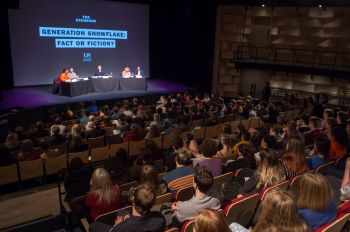
The inaugural Exchange event
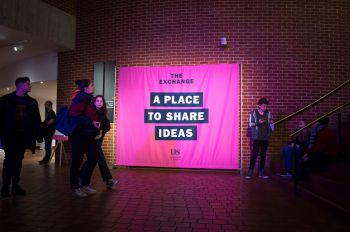
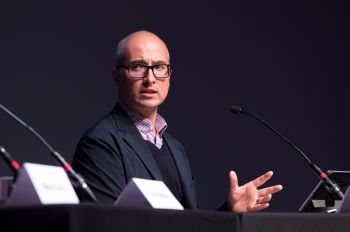
Event chair, Dr Sharif Mowlabocus
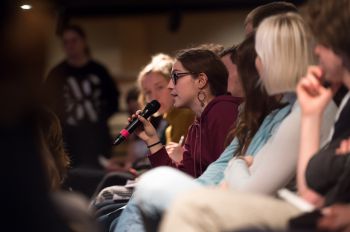
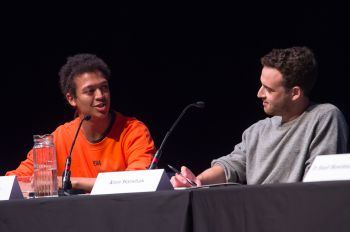
Solomon Curtis (left) and Alon Harshak (right)
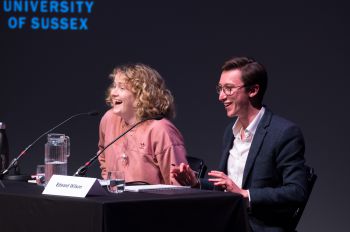
Grace Campbell (left) and Edward Wilson (right)
Thursday evening saw the first ever event of The Exchange: a new initiative, led by the University’s External Relations division, designed to encourage free expression and lively debate.
Hosted at the Attenborough Centre for the Creative Arts – with the exterior dimly lit in fuchsia pink for the occasion - the panel discussion centred on the recent debate around ‘Generation Snowflake’ and whether this term actually exists in the way that it is portrayed in the media.
Chaired by Senior Lecturer in Media Studies and Digital Media, Dr Sharif Mowlabocus, the four panellists were :
- Solomon Curtis – Former Sussex student, Labour candidate for Brighton Pavilion in the 2017 general election and Communications Manager at the Mayor of London’s Office
- Grace Campbell – Writer, comedian and activist. Also co-founded The Pink Protest, a community platform for female activism and home to the #freeperiods campaign
- Alon Harshak – Former Sussex student and freelance educator and researcher working on various projects supporting refugees and asylum seekers
- Edward Wilson – Current Politics and International Relations student and former Vice-President of the Conservative Society. He was an active member of Liberate the Debate, the free speech student society.
Together with a packed audience of more than 250 people - the majority of whom were students - in the Attenborough Centre’s auditorium, the panellists explored some key points in the recent debate.
The night started with a definition of ‘Generation Snowflake’ from the Collins English Dictionary, which defines it as a way of referring to the type of young people who are considered by some people to be too easily upset and offended. The panel then discussed the origins of the phrase and, in light of its heavy circulation in printed media and online, whether it actually had any meaning at all in the lives of young people.
Campbell doubted that it was a “thing”, declaring that it was a term used to “calm people down”. Curtis believed that the term was irrelevant to the majority of young people just trying to get through life, while Harshak suggested it was used by an older generation fearful of a more social media-savvy younger generation.
Interspersed with questions from the audience, the panel then moved on to discuss the role of social media, given the role it plays in the lives of young people, and whether the sometimes antagonistic nature of a platform such as Twitter magnifies this debate in a way that it never did before.
Wilson asserted that Twitter was radicalising young people – although Curtis pointed out that only 10 per cent of young people used Twitter.
By this point, the questions – both online and from the audience – were coming thick and fast, which then led the panel to enter new territory by discussing the role comedy plays in taking offence, and whether offensive jokes could now be accepted in today’s society?
Campbell in particular highlighted that comedians should never "level down" a joke and that they almost had a duty to ensure their material didn’t set out to hurt those in society who were most vulnerable to attack.
However, on the topic of the ‘no platforming’ of certain speakers from events, Wilson insisted that universities should be places of freedom of expression and that no platforming of any speaker was a counter-productive measure totally at odds with this concept. Mowlabocus pointed to recent events at other universities such as the use of ‘jazz hands’ in place of clapping or the no-platforming of speakers such as Germaine Greer.
In response, Harshak pointed to the importance of ‘safe spaces’ in ensuring that the most vulnerable had a place where they felt totally safe and isolated from potentially upsetting language.
Finally, Mowlabocus raised the question of mental health in this debate, in particular around the (sometimes misleading) perception that young people nowadays lacked the resilience of their elder counterparts.
Curtis referenced the most recent statistics of mental health issues affecting young people and the unprecedented challenges that young people now face in response to a cost-of-living crisis and the uncertainty created by Brexit.
Last night’s event was the launch of The Exchange, a new initiative to encourage the sharing of ideas. Through live events and digital content, The Exchange invites energetic and diverse voices to spark discussions and offer fresh perspectives on the issues they care about.
The next event for The Exchange is taking place on Thursday 29 November at Small Batch Coffee Roasters. Jo Cutler will be in conversation with Al Tomlins, founder of Small Batch, talking about kindness. For more information and to book, visit the University website.
